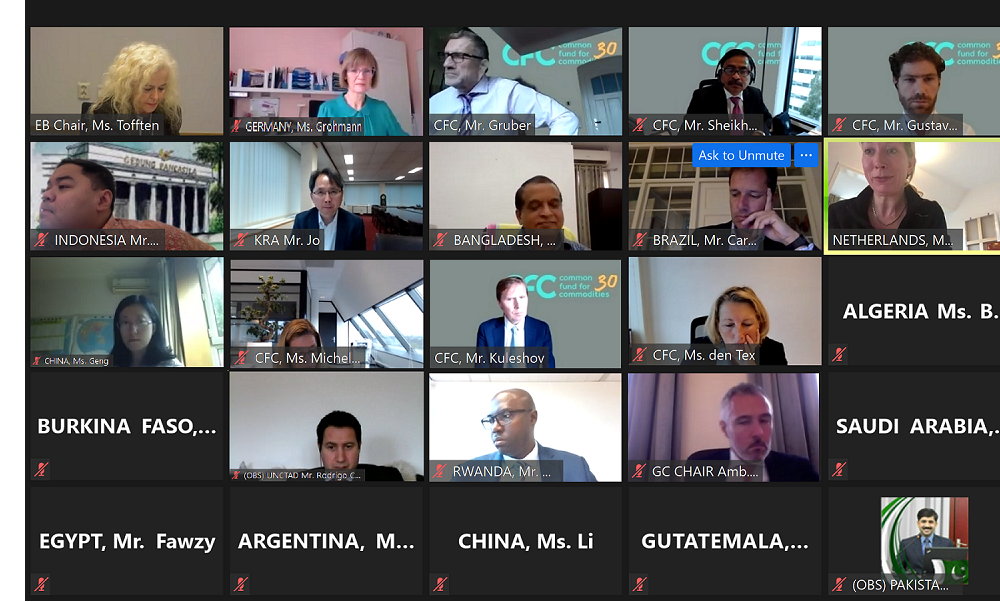CFC holds 70th Meeting of the Executive Board by Teleconference
For the second time this year, due to the COVID-19 pandemic, the CFC had to arrange its Executive Board Meeting by teleconference, chaired by Ms. Anna Tofftén (Sweden). The meeting was well attended, including H.E. Ms. Maria Resende Encoge, Ambassador of Angola; H.E. Ms. Jaqueline Zaba/Nikiema, Ambassador of Burkina Faso; H.E. Ms. Soraya Alvarez Nuñez, Ambassador of Cuba; H.E. Mr. Million Samuel Gebre, Ambassador of Ethiopia; H.E. Mr. Eduardo Sperisen Yurt, Ambassador/Permanent Representative of Guatemala; H.E. Mr. Shujjat Ali Rathore, Ambassador of Pakistan; H.E. Mr. Kamal Bashir Ahmed, Ambassador of Sudan; and H.E. Ms. Haifa Aissami Madah, Ambassador of Venezuela. H.E. Mr. Mario Oyarzábal (Argentina) attended the meeting as Acting Chairperson of CFC’s Governing Council for 2020, and Mr. Wilson Andrade (Brazil) attended as Chairperson of the Consultative Committee (CC). Mr. Rodrigo Carcamo representing UNCTAD was also attending as Observer.
In his opening remarks, Managing Director Sheikh Mohammed Belal addressed the challenges that the COVID-19 pandemic continues to pose to the commodity producers. As this has hampered trade, transport and distribution, Ambassador Belal highlighted the necessity to join efforts into supporting the most affected countries. It was noted that Least Developed Countries (LDCs) and Landlocked Developing Countries (LLDCs) remain in a vulnerable position and may suffer the worst impact from the effects from the pandemic.
In his opening remarks, Managing Director Sheikh Mohammed Belal addressed the challenges that the COVID-19 pandemic continues to pose to the commodity producers. As this has hampered trade, transport and distribution, Ambassador Belal highlighted the necessity to join efforts into supporting the most affected countries. It was noted that Least Developed Countries (LDCs) and Landlocked Developing Countries (LLDCs) remain in a vulnerable position and may suffer the worst impact from the effects from the pandemic.
The Executive Board discussed five project proposals that were submitted through the 16th Call for Proposals and recommended by the Consultative Committee. After careful consideration, all five projects were approved by the Board to receive CFC finance. The total cost of projects approved equals USD 17 million, of which the CFC contributes USD 7,4 million, in form of loans.
These projects, based in Bangladesh (LDC), Benin (LDC), Burundi (LDC), Colombia and Kenya, cover commodities such as cocoa, jute and fruits. Moreover, they strive to achieve SDG 1 (No Poverty), SDG 2 (Zero Hunger), SDG 5 (Gender Equality), SDG 8 (Decent Work and Economic Growth) and SDG 10 (Reduced Inequalities).
Overall, these projects combined are expected to reach almost 10,000 smallholder farmers, create 500 permanent jobs, of which 350 will be for women, and cultivate 9,000 ha of additional land.
During the meeting, both national and international efforts to combat COVID-19 were praised, demonstrating the power of collaboration and solidarity in exceptional times. In this regard, the creation of CFC’s Emergency Liquidity Facility (ELF) was highlighted. The ELF, approved by the Executive Board in June of this year, offers additional support to the CFC projects that have been impacted by the pandemic, providing immediate working capital to qualifying SMEs who are at risk of terminating their operations. With the ELF, the CFC aims to give healthy businesses access to short-term liquidity to help them endure the immediate effects of the crisis.
The Executive Board also listened to Mr. Nadhiro (Rwanda), Chairperson of the Open-ended working Group who delivered his interim report on the activities on the formation of the Sustainable Fund Management. Mr Nadhiro while apprising the EB on the activities of the open ended working group, proposed to the EB to bring this to the attention of the Governing Council in December next. The Chair encouraged the Member States to take active part in this effort to strengthen the public private partnership in the work of the CFC and enhance its capacity to deliver on the expectations of Members.
As the CFC celebrated its 31st anniversary on September 15, its role in poverty alleviation was recognized, thus addressing the necessity to continue concentrating efforts in order to make a difference.

